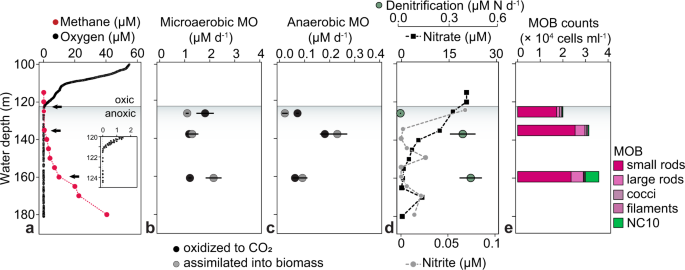2024-08-13 マックス・プランク研究所
<関連情報>
- https://www.mpg.de/22478269/0809-mbio-bacteria-in-lakes-fight-climate-change-154772-x
- https://www.nature.com/articles/s41467-024-49602-5
好気性メタン酸化細菌の無酸素湖沼水中での持続的な活性は代謝の多様性による Persistent activity of aerobic methane-oxidizing bacteria in anoxic lake waters due to metabolic versatility
Sina Schorn,Jon S. Graf,Sten Littmann,Philipp F. Hach,Gaute Lavik,Daan R. Speth,Carsten J. Schubert,Marcel M. M. Kuypers & Jana Milucka
Nature Communications Published:21 June 2024
DOI:https://doi.org/10.1038/s41467-024-49602-5

Abstract
Lacustrine methane emissions are strongly mitigated by aerobic methane-oxidizing bacteria (MOB) that are typically most active at the oxic-anoxic interface. Although oxygen is required by the MOB for the first step of methane oxidation, their occurrence in anoxic lake waters has raised the possibility that they are capable of oxidizing methane further anaerobically. Here, we investigate the activity and growth of MOB in Lake Zug, a permanently stratified freshwater lake. The rates of anaerobic methane oxidation in the anoxic hypolimnion reached up to 0.2 µM d-1. Single-cell nanoSIMS measurements, together with metagenomic and metatranscriptomic analyses, linked the measured rates to MOB of the order Methylococcales. Interestingly, their methane assimilation activity was similar under hypoxic and anoxic conditions. Our data suggest that these MOB use fermentation-based methanotrophy as well as denitrification under anoxic conditions, thus offering an explanation for their widespread presence in anoxic habitats such as stratified water columns. Thus, the methane sink capacity of anoxic basins may have been underestimated by not accounting for the anaerobic MOB activity.


